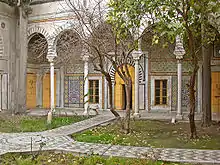Dar Othman
Dar Othman is one of the palaces of the medina of Tunis. The residence is located in the south of the medina, 16 El Mebazaâ Street.[1]

History
Dar Othman was built in the end of the sixteenth century (around 1595)[2] by Othman, dey of Tunis, who reigned from 1593 to 1610. During the first half of the 19th century, Al-Husayn II ibn Mahmud transformed it into a provision's house to store supplies for soldiers staying in barracks of the neighborhood. Thus, the palace is also called Dar Al Oula (provision's house).[1]
Afterwards, the residence was bequeathed by Muhammad III as-Sadiq to his grand vizier Mustapha Ben Ismaïl.[1] In 1936, the palace got classified as an historical monument. It was first allocated to the National Institute of Archaeology and Art (known these days as the National Heritage Institute). Nowadays, it is the headquarters of the preservation of the medina of Tunis.[1]
Description
The facade of the residence is composed of two lintels of arch-stone separated by a pointed horseshoe arch and a wooden pergola over the door. It also has two Andalusian style columns in the lower part and two Hafsid style columns in the upper part.[3]
The entrance door leads to a driba (square vestibule). The floor is paved with Kadhal flagstones. Walls are surrounded by stone benches. The ceiling, which rises in stages from bottom to top, is decorated with an Andalusian style stucco-work.[3]
The vestibule leads to the courtyard which has only two porticoes (unlike the majority of the medina's palaces which are surrounded by four porticoes).
Four T-shaped rooms surround the courtyard. Each one of them contains two alcoves.[2]
 dar othman
dar othman.JPG.webp) Entrance of dar othman
Entrance of dar othman facade of Dar Othman
facade of Dar Othman Court of Dar Othman
Court of Dar Othman A door at Dar Othman
A door at Dar Othman Decoration of Dar Othman
Decoration of Dar Othman A tomb at dar Othman
A tomb at dar Othman
Bibliography
- Binous, Jamila (2000). "Dar Othman". Ifriqiya, treize siècles d'art et d'architecture en Tunisie. Tunis: Démetér. pp. 77–79.
References
| Wikimedia Commons has media related to Dar Othman. |
- "Dar Othman Dey". commune-tunis.gov.tn (in French). Archived from the original on 4 March 2016. Retrieved 8 August 2016.
- "Dâr 'Uthmân". qantara-med.org (in French). Archived from the original on 22 January 2015. Retrieved 8 August 2016.
- "Dar 'Uthman". discoverislamicart.org (in French). Retrieved 8 August 2016.
External links
- "Dar Othman – Siège de la Conservation de la Médina de Tunis". culture.alecso.org (in French). Retrieved 8 August 2016.